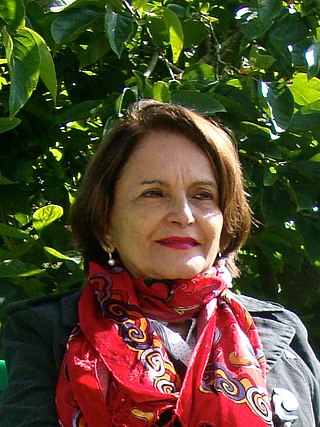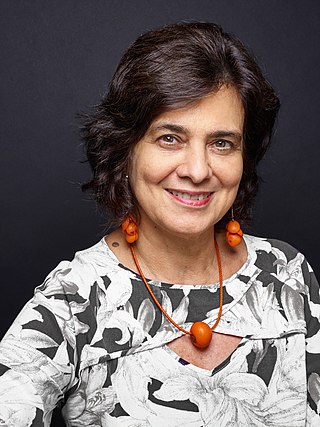Related Research Articles
Bernardo Sorj is a Brazilian social scientist, retired professor of Sociology at the Federal University of Rio de Janeiro. He is Director of The Edelstein Center for Social Research and of the Plataforma Democrática Project. He has published 30 books and more than 100 articles, on Latin American political development, international relations, the social impact of new technologies, social theory and Judaism.

Maria Lacerda de Moura was a Brazilian teacher, writer and anarcha-feminist. The daughter of spiritist and anti-clerical parents, she grew up in the city of Barbacena, in the interior of Minas Gerais, where she graduated as a teacher at the Escola Normal Municipal de Barbacena and participated in official efforts to tackle social inequality through national literacy campaigns and educational reforms.
Simon Schwartzman is a Brazilian social scientist. He has published extensively, with many books, book chapters and academic articles in the areas of comparative politics, sociology of science, social policy, and education, with emphasis on Brazil and Latin America. He was the President of the Brazilian Institute for Geography and Statistics (IBGE) and is a retired professor from the Federal University of Minas Gerais. He is member of the Brazilian Academy of Sciences, holder of the Grand Cross of the Brazilian Order of Scientific Merit (1996). He is currently associate researcher at the Institute for Studies in Economic Policy Instituto de Estudos de Política Econômica / Casa das Garças - Rio de Janeiro.

Ruth Vilaça Correia Leite Cardoso GCIH was a Brazilian anthropologist and a former member of the Faculty of Philosophy, Letters and Human Sciences at the University of São Paulo (FFLCH-USP). She was the wife of 34th President of Brazil, Fernando Henrique Cardoso, and First Lady of her country between 1 January 1995 to 31 December 2002. She too was a Ph.D in anthropology from the University of São Paulo.

Nísia Floresta Brasileira Augusta, pseudonym of Dionísia Gonçalves Pinto, was a Brazilian educator, translator, writer, poet and feminist.

Boaventura de Sousa Santos is a sociologist, Professor emeritus at the Department of Sociology of the School of Economics of the University of Coimbra (FEUC), Distinguished Legal Scholar at the University of Wisconsin-Madison Law School, and Director Emeritus of the Centre for Social Studies (CES) at the University of Coimbra. A Marxist, outspoken sympathizer and avowed supporter of the Bloco de Esquerda party, he is regarded as one of the most prominent Portuguese living left-wing intellectuals. In 2023, after a sexual harassment scandal, the University of Coimbra suspended his academic positions until the events are investigated.
Chôros is the title of a series of compositions by the Brazilian composer Heitor Villa-Lobos, composed between 1920 and 1929.
Maria Isaura Pereira de Queiroz was a Brazilian sociologist.
Founded in Rio de Janeiro in 1962 by Augusto Trajano de Azevedo Antunes (Caemi) and Antônio Gallotti, the Instituto de Pesquisas e Estudos Sociais, or IPÊS, was one of the two leading conservative think tanks organized from the late 1950s with the explicit goal to prevent what was deemed as the spread of Communism over Brazil. However, differently from the IBAD, that openly funded the campaigns of anti-Communist politicians, the IPES centered its work in the field of anti-governmental propaganda, through the production of movies of "democratic indoctrination", financing of courses, seminars and lectures, publishing of anti-Communist books and pamphlets and the cooptation of organizations opposing the government of President João Goulart, such as the Círculos Operários, the Brazilian Confederation of Christian Workers (CBTC), the União Cívica Feminina of São Paulo and the Movimento Universitário de Desfavelamento. In 1963, its activities were investigated by a Parliamentary Commission of Inquiry (CPI), but the Institute was acquitted. In 1966, two years after the military coup that overthrew João Goulart, the IPÊS was recognized as an "entity of public utility" through a presidential decree. The IPÊS survived until 1972 in Rio de Janeiro.

Lélia Gonzalez was a Brazilian intellectual, politician, professor, anthropologist and a woman human rights defender.
Albertina de Oliveira Costa is a Brazilian sociologist, editor, theoretician and feminist activist. A member of the Carlos Chagas Foundation, she is one of the principal investigators of issues related to women's studies in Brazil. Costa graduated with a degree in social sciences from the University of São Paulo. Her theoretical themes are in the field of gender studies but from a feminist perspective closer to activism, defending the rights of women, public policies and human rights. She is a member of the National Council for the Rights of Women and is editor of the journal Cadernos de Pesquisa. She has also collaborated in Revista Estudos Feministas and in Cadernos Pagu while sitting on the executive committee of the International Journal of Human Rights.

Alba Maria Zaluar was a Brazilian anthropologist, with emphases in urban anthropology and in anthropology of violence. In 1984, she obtained her PhD in social Anthropology at the Federal University of Rio de Janeiro.
Mariza Corrêa was a Brazilian anthropologist and sociologist. She was professor at the Department of Anthropology of the State University of Campinas (Unicamp).
Renina Katz Pedreira, known as Regina Katz, is a Brazilian engraver, printmaker, and watercolorist. Together with Edith Behring and Fayga Ostrower, she is part of the generation of Brazilian women engravers that art historian Geraldo Edson de Andrade calls the "matriarchy of engraving in Brazil".
Márcia Pinheiro de Oliveira was a Brazilian performer and visual artist. Her performances, videos and installations deal with themes of sexuality, eroticism, consumerism, childhood and religion, often using sex toys, children's toys and religious artifacts.

Marie Rennotte was a Belgian-born Brazilian physician, teacher, and women's rights activist. She was active in the fight for women's rights. After earning her teaching credentials in Belgium and France, Rennotte taught for three years in Germany before moving to Brazil as a governess. Giving private lessons and teaching at a girls' school, she lived in Rio de Janeiro from 1878 to 1882. Hired to teach in the State of São Paulo, she moved to Piracicaba where from 1882 to 1889 she taught science, developed the curriculum, and enhanced the reputation of the Colégio Piracicabano. The co-educational school was an innovative institution offering equal education to girls and boys.

Luís Gonzaga Duque Estrada, known as Gonzaga Duque was a Brazilian writer and critic. He was of Swedish descent on his father's side.
Jaime Cubero was a Brazilian intellectual, journalist, educator and activist linked to the anarchist movement. While still in his teens he founded, with the help of friends, the Youth Center for Social Studies. He participated in numerous activities in cultural centers in Rio de Janeiro and São Paulo. As an active anarchist militant, he maintained a line critical to the Estado Novo of Getúlio Vargas and the military dictatorship in Brazil, as well as the authoritarianism of Brazilian political parties and Marxists.

Mário Xavier de Andrade Pedrosa was a Brazilian art and literary critic, journalist and political activist.

Nísia Trindade Lima is a Brazilian social scientist, sociologist, researcher and university professor who has been serving as Minister of Health of Brazil since 2023. She served as chairwoman of Oswaldo Cruz Foundation from 2017 to 2023.
References
Citations
- 1 2 3 4 Marriage records 1970, p. 191.
- 1 2 Sorj 2012, p. 210.
- 1 2 3 4 5 6 7 8 9 10 11 12 13 14 15 16 17 18 19 Araujo & Moraes 2021.
- ↑ Sorj 2012, pp. 30–31.
- 1 2 3 4 5 Escavador 2020.
- ↑ Sorj 2012, p. 145.
- 1 2 Sorj 2012, p. 152.
- ↑ Sorj 1979.
- 1 2 3 Candido & Toste Daflon 2017, p. 8.
- ↑ Fundação Carlos Chagas 2020.
- ↑ Lavinas & Lamego 1992, p. 242.
- ↑ Thomaz & Nascimento 2001, pp. 192–194.
- ↑ Gonçalves 2016, pp. 94–95.
- ↑ Alves 2021, p. 441.
- ↑ Alves 2021, p. 442.
- ↑ Grecco 2017, pp. 389–392.
Bibliography
- Alves, Andrea Moraes (July–December 2021). "Resenha: 'Clássicas do Pensamento Social: mulheres e feminismos no século XIX'" [Review: 'Classics of Social Thought: Women and Feminisms in the 19th Century']. Praia Vermelha (in Portuguese). Rio de Janeiro, Brazil: Federal University of Rio de Janeiro. 31 (2): 440–443. ISSN 1414-9184 . Retrieved 10 April 2023.
- Araujo, Anna Bárbara; Moraes, Aparecida F. (2021). "Bila Sorj". Sociedade Brasileira de Sociologia (in Portuguese). Porto Alegre, Brazil: Brazilian Sociological Society. Archived from the original on 9 April 2023. Retrieved 9 April 2023.
- Candido, Marcia Rangel; Toste Daflon, Verônica (2017). "Bila Sorj: Socióloga e pioneira nos estudos de gênero no Brasil" [Bila Sorj: Sociologist and Pioneer in Gender Studies in Brazil]. Cadernos de Estudos Sociais e Políticos (in Portuguese). Rio de Janeiro, Brazil: Instituto de Estudos Sociais e Políticos, Universidade do Estado do Rio de Janeiro . 6 (11): 8–9. ISSN 2238-3425. Archived from the original on 19 March 2020. Retrieved 9 April 2023.
- Gonçalves, Suelen Aires (April 2016). "Morte violenta de mulheres: uma análise acerca das ocorrências de feminicídios na cidade de Santa Maria/RS" [Violent Death of Women: An Analysis of the Occurrences of Femicides in the City of Santa Maria, Rio Grande do Sul]. Conversas e Controvérsias (in Portuguese). Porto Alegre, Brazil: Pontifical Catholic University of Rio Grande do Sul. 3 (2): 88–108. ISSN 2178-5694. OCLC 9118293383. Archived from the original on 2 August 2022. Retrieved 9 April 2023.
- Grecco, Fabiana Sanches (May–August 2017). "Resenha: Abreu, Alice Rangel de Paiva; Hirata, Helena; Lombardi, Maria Rosa. (Orgs.) 'Gênero e Trabalho no Brasil e na França: perspectivas interseccionais'. São Paulo: Boitempo, 2016. Guimarães, Nadya Araujo; Maruani, Margaret; Sorj, Bila (Orgs.). 'Genre, race, classe. Travailler en France et au Brésil'. França: L'Harmattan, 2016" [Review: Abreu, Alice Rangel de Paiva; Hirata, Helena; Lombardy, Maria Rose. (Eds.) 'Gender and Work in Brazil and France: Intersectional Perspectives'. São Paulo: Boitempo, 2016. Guimarães, Nadya Araujo; Maruani, Margaret; Sorj, Bila (Eds.). 'Gender, Race, Class: Working in France and Brazil'. France: L'Harmattan, 2016.]. Caderno CRH (in Portuguese). Salvador, Bahia, Brazil: Universidade Federal da Bahia. 30 (80): 389–392. doi:10.1590/S0103-49792017000200011. ISSN 0103-4979 . Retrieved 9 April 2023.
- Lavinas, Lena; Lamego, Valéria, eds. (1992). "Colaboradores" [Collaborators]. Revista Estudos Feministas (in Portuguese). Rio de Janeiro, Brazil: Interdisciplinar de Estudos Contemporâneos da Escola de Comunicação da Universidade Federal do Rio de Janeiro. 1 (1): 242–243. ISSN 0104-026X. OCLC 6864701369 . Retrieved 9 April 2023.
- Sorj, Bernardo (2012). Vai embora da casa de teus pais [Leave Your Parents' House](PDF) (in Portuguese). Rio de Janeiro, Brazil: Civilização Brasileira. ISBN 978-85-200-1086-0. Archived (PDF) from the original on 27 February 2022.
- Thomaz, Omar Ribeiro; Nascimento, Sebastião (November 2001). "Uma terra de muitos exílios: 'Israel, terra em transe. Democracia ou teocracia?', de Guila Flint e Bila Grin Sorj. Rio de Janeiro: Civilização Brasileira, 2000, 352 pp" [A Land of Many Exiles:'Israel, Land in a Trance: Democracy or Theocracy?', Guila Flint and Bila Grin Sorj. Rio de Janeiro: Civilization Brazilian, 2000, 352 pp]. Novas Estudos (in Portuguese). São Paulo, Brazil: Centro Brasileiro de Análise e Planejamento. 61 (6): 192–198. ISSN 0101-3300.
- "Bila Sorj". Escavador (in Portuguese). Salvador, São Paulo, Brazil: Escavador. 24 June 2020. Archived from the original on 27 March 2022. Retrieved 8 April 2023.
- "Casamento No. 15388: Bernardo Sorj Yudcowsky e Bila Grim" [Marriage No. 15388: Bernardo Sorj Yudcowsky e Bila Grim]. FamilySearch (in Portuguese). São Paulo, Brazil: Corregedor Geral da Justicia. 27 September 1970. p. 191. Retrieved 8 April 2023.
- "'Mulherio': Uma história" ['Woman': A story]. fcc.org (in Portuguese). Brazil: Fundação Carlos Chagas. 2020. Archived from the original on 21 May 2022. Retrieved 9 April 2023.